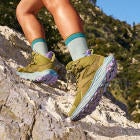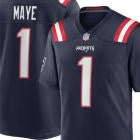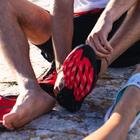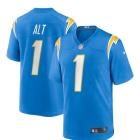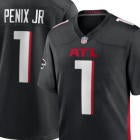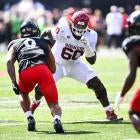
Your outdoor adventures need a hiking boot that can keep up. That means it should be durable and weatherproof enough to handle all conditions, yet comfortable enough to log multiple miles on hilly, slippery and gritty terrain.
Whether you're shopping for your first pair of hiking boots or simply looking to replace your current pair, finding that perfect balance of plush comfort and rugged durability can be tough. So we thought we'd give you a head start on your hunt by rounding up the best hiking boots for any trail you're planning to tackle in 2024.
The best hiking boots for every trail in 2024
Here are our favorite hiking boots to tackle any trail, from a pillowy-soft Hoka to a heavy-duty Columbia snow boot.
Best hiking boots overall: Hoka Anacapa 2 Mid GTX

Hoka is well-known for its ultra comfortable running shoes and walking shoes, but the brand also makes great hiking boots. The Hoka Anacapa 2 Mid GTX, for example, received the American Podiatric Medical Association seal of acceptance as a comfortable, supportive boot.
The premium hiking boot features a lightweight EVA midsole, plush ankle collar and soft sock liner so your foot is completely enveloped in cloud-like comfort. A Gore-Tex liner and water resistant leather upper protect your feet from the elements as you trek through mud, gravel and dirt.
Get the rugged yet cushy Hoka hiking boots for $195.
Top features of the Hoka Anacapa 2:
- The pillowy soft inside keeps your feet comfortable all day long.
- A waterproof exterior with breathable mesh panels help keep your feet dry without trapping heat.
- A rugged, deep-lugged sole provides maximum traction for navigating difficult terrain.
Shop men's sizes:
$195 at HokaShop women's sizes:
$195 at HokaBest waterproof hiking boots: Merrell Moab 3

Featuring a removable contoured insole, a molded nylon arch shank and reinforced heel cushioning, Merrell Moab 3 waterproof hiking boots offer complete support to prevent fatigue and keep your feet comfortable whether you're hiking a 2-mile trail or a 2,000-mile trail.
The unique waterproofing membrane on these hiking boots blocks out water when trekking through mud or shallow water. Meanwhile, breathable mesh panels on the top of the shoe help you avoid overheating -- a common problem with waterproof shoes.
The 4.6-star rated hiking boot is on sale now for as low as $94 for women's sizes and $82 for men's sizes (reduced from $150).
Top features of the Merrell Moab 3:
- A waterproof membrane keeps moisture out without trapping sweat in.
- Merrell Air Cushion heels provide extra shock absorption and stability.
- The bellows tongue and ankle collar keep mud and debris from getting inside.
Shop men's sizes:
$82 and up at AmazonShop women's sizes:
$94 and up at AmazonBest trail running shoes you can hike in: Nike Wildhorse 8

The Nike Wildhorse 8 is a dedicated trail running shoe, made for the toughest of terrains. This latest version is a complete redesign that ditches the bulky rubber heel and gaiter collar around the ankle that were added to the Wildhorse 7 to make a lighter, nimbler running shoe that still offers plenty of cushion and stability.
It's built with the same responsive React foam found in the popular Nike Pegasus 40s, but adds a rock plate in the forefoot for extra cushion when running on rocky or uneven trails. On the outsole, you'll find deep, tread made from high-abrasion rubber to help give you a solid grip on the trail, even when you're running up or down steep inclines.
These details make it a great option for hikers who want a lightweight alternative to bulky hiking boots.
Select colorways of the durable trail running shoes are on sale at Nike for as low as $84 (reduced from $140).
Top features of the Nike Wildhorse 8:
- High-abrasion rubber on the outsole provides maximum grip for the toughest terrain.
- A rock plate in the forefoot protects your foot from rough terrain.
- The midfoot saddle provides support to the arch and prevents movement inside the shoe.
- It's lightweight and responsive for a more efficient stride.
Shop men's sizes:
$84 and up at NikeShop women's sizes:
$120 and upBest winter hiking boots: Columbia Bugaboot Celsius

For icy trails and subzero hikes, you need a heavy-duty boot with extra support and extra warmth. That's the Columbia Bugaboot Celsius. This snowboot features a waterproof leather exterior wrapped around 200 grams of insulation to keep your foot warm, dry and protected from all the elements. It's like a parka for your foot.
Deep, angled lugs on the sole offer next-level traction so you can navigate slushy, slippery winter trails with confidence. That serious traction is paired with a tall, sturdy upper that wraps around your ankle and lower leg for extra thermal protection and stability.
One of our favorite boots to add to your cold weather gear collection, the Columbia Bugaboot Celsius is priced as low as $67 at Amazon.
Top features of the Columbia Bugaboot Celsius:
- With 200 grams of insulation, these are just right for most winter hikes.
- The taller boot insulates and protects your entire foot and ankle.
- Advanced traction on the sole provides stability on all terrain.
- The waterproof leather keeps your feet dry even while trekking through snow and mud.
Shop men's sizes:
$75 and up at AmazonShop women's sizes:
$67 and up at AmazonMost comfortable hiking boots: Timberland Mt. Maddsen

Timberland got its start making work boots, so many of its boots already offer the comfort, traction and protection that a hiker needs on the trail. The Timberland Mt. Maddsen Mid is the perfect example of that.
With a gusseted tongue to keep out debris and the brand's exclusive anti-fatigue technology, these hiking boots are exceptionally comfortable even on the longest hikes. That comfort is paired with reliable support, too. Deep lugs and a TPU shank in the midsole provide stability and prevent your foot from shifting as you walk.
The stylish and comfy hiking boot is $120 at REI, but select colorways are on sale for as low as $60.
Top features of the Timberland Mt. Maddsen:
- The premium full-grain leather upper is stylish and waterproof.
- These hiking boots are designed with Timberland's exclusive anti-fatigue technology.
- The cushy tongue is gusseted to keep debris out.
- Great traction and a rigid construction provide plenty of stability for navigating tricky terrain.
Shop men's sizes:
$120 at REIShop women's sizes:
$60 and up at REIShop more top-rated hiking boots:
- Cushy trail running shoes you can hike in: Hoka Speedgoat 5, $155
- Tough hiking boots for backpackers: Salomon Quest 4 GTX, $230
- Comfy insulated hiking boots for winter: The North Face Vectiv Fastpack Futurelight, $97 (reduced from $195)
- A pair of sleek-yet-rugged hiking boots: Lowa Renegade GTX, $255
What can I hike in if I don't have hiking boots?
If you're new to hiking, you might not be ready to invest in a quality pair of hiking boots. In a pinch, any closed-toe athletic shoe will do. But we recommend getting something with good traction and good support. They should also be comfortable enough to wear on a long hike.
So if you're still figuring out whether you even enjoy hiking enough to invest in the best gear, consider picking up a good pair of walking shoes or running shoes instead. That way, you know you'll still get some use out of them even if you ultimately decide hiking is not for you.
Should hiking boots be a size bigger?
The short answer: No, you shouldn't get hiking boots a size bigger than your normal shoe size. The reason you might have heard this is to make room for bulkier socks in winter. But bulky socks don't do nearly as good a job at keeping your foot warm as a good pair of insulated hiking boots.
Instead, treat your socks like a base layer. They should be thin but made from a good insulating material like merino wool. For mild winter hikes, that base layer and your regular hiking boots should be plenty to keep your foot warm but not overheated. In extreme cold, keep the socks and swap out your regular boots for some insulated hiking boots to get extra protection from the freezing temperatures.
The problem with sizing up hiking boots is that the looser fit can increase your risk of injury on the trail. A good boot should be snug around your foot and provide enough support to prevent twisted ankles. Bulky winter socks don't provide the same support as a properly sized hiking boot.











